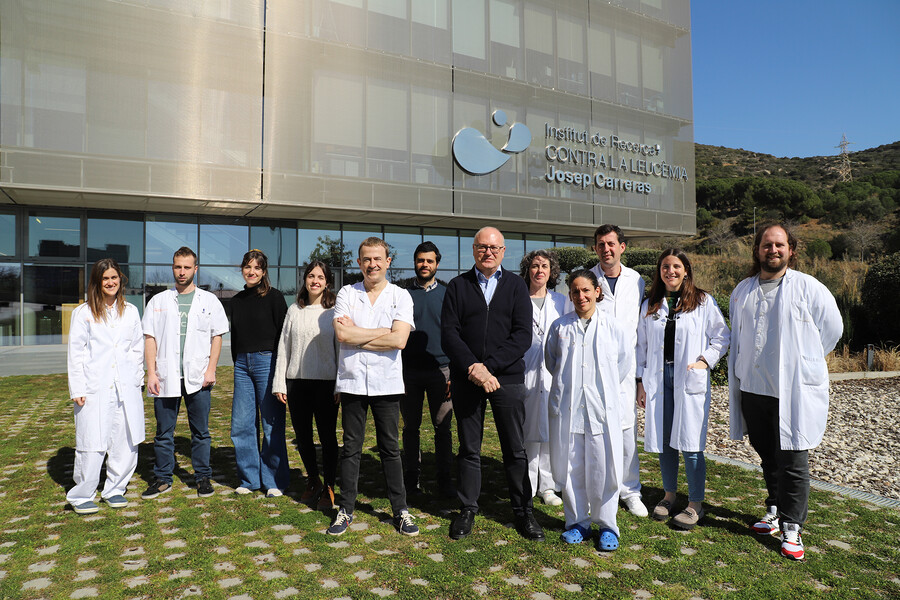
Program
Population studies and clinical trials
Belongs to
Contact
Introduction
Our research unit is composed of professionals with a strong clinical and biological background in lymphoproliferative diseases, with a particular focus on those arising in the context of immune system dysregulation or deficiency, such as in HIV infection. This heterogeneous group includes aggressive lymphomas -such as diffuse large B-cell lymphoma (DLBCL), Burkitt lymphoma (BL), plasmablastic lymphoma (PBL), and primary effusion lymphoma (PEL), as well as proliferative disorders like Castleman disease (CD). Most of the above-mentioned nosological entities are very rare, characterized by complex biology and often excluded from clinical trials. As a result, the understanding of their onset and evolution represents a big challenge for the whole scientific community. As a group, we have already contributed to defining some clinical and biological features of these diseases, including through high-profile international collaborations (Baptista MJ, et al. Histopathology 2022; Hübel K, et al. Hemasphere 2024; Pierson SK, et al. Blood Adv 2025; Verdu-Bou M, et al. Blood Adv 2025 Apr). We are therefore committed to providing further meaningful contributions in this field that can be translated from bench to bedside.
Our Research
Our main areas of research are:
Genomic studies on HIV-related lymphomas. According to the latest reports, HIV still represents a major public health concern. People with HIV (PWH) have an increased risk of B-cell aggressive non-Hodgkin lymphomas (B-NHL), such as DLBCL and BL. Although HIV-infected patients are treated with the same regimens as HIV-negative individuals and receive proper anti-infective prophylaxis, their survival rate is still lower. Therefore, we investigate the genetic and molecular intricate mechanisms underlying this dismal prognosis, with particular focus on cross-talk between HIV and other viruses, affecting PWH and supporting lymphomagenesis, such as EBV.
Liquid biopsy in aggressive lymphomas. In the era of personalized therapy, the implementation of easy and non-invasive techniques for the early diagnosis and follow-up of aggressive lymphomas represents an unmet clinical need. Therefore, we investigate the feasibility of liquid biopsy applied to DLBCL, being the most frequent B-NHL.
Clinical and biological studies on Castleman disease. Due to its heterogeneity and its low incidence, Castleman disease is a very challenging hematologic disorder. We are actively engaged in collaborations with other national and international institutions to collect clinical and biological data from Castleman patients in order to improve the understanding of its pathogenesis and hopefully lead to a harmonization of therapeutics.
Cytogenetic characterization of aggressive lymphomas. The cytogenetic landscape underlying B-NHL is extremely heterogenous and novel tools for a more extensive assessment of it are required to improve the risk-stratification and personalize the treatment combinations. For this reason, we are aiming to analyze by the cutting-to-edge technology of optical genome mapping DLBCL cases with atypical rearrangements and complex karyotype.
Our Goals
To clarify the complex genetic and molecular interactions supporting the development of these challenging lymphoid neoplasms;
To identify potential biomarkers with real-world applicability;
To guide the design of new targeted therapies, based on the identified aberrations.
Our Challenges
By achieving the goals outlined above, we firmly believe we can make a meaningful contribution to the international effort aimed at improving the early diagnosis and clinical management of both malignant and non-malignant lymphorative disorders associated with immunosuppression and immune dysregulation. Our translational approach holds the promise of improving the life expectancy of specific subgroups of hematologic patients who, to date, remain particularly challenging to treat.
